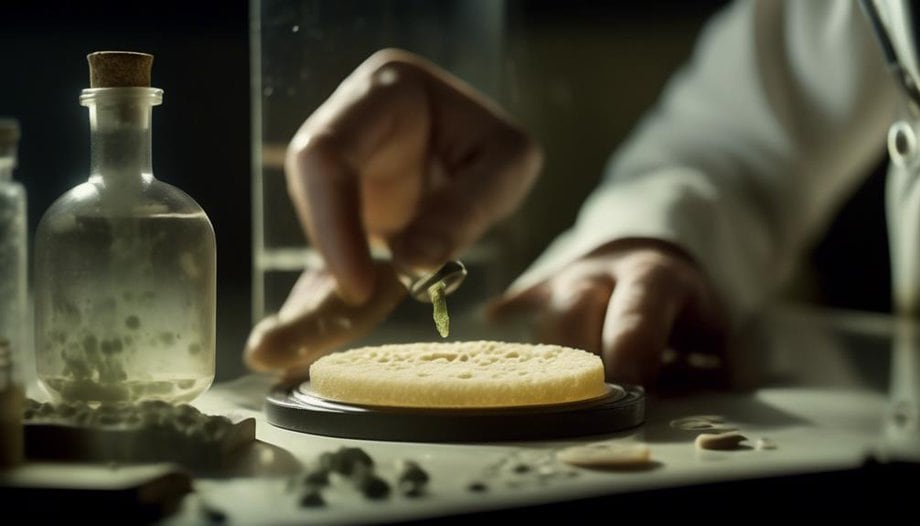Penicillin Discovery (1928) – Fleming: Recap and Summary: Antibiotic Breakthrough

The discovery of penicillin by Alexander Fleming in 1928 was a groundbreaking scientific breakthrough. It revolutionized medicine and saved countless lives.
Key Takeaways
- Fleming's discovery of penicillin in 1928 was a serendipitous breakthrough in medicine.
- Penicillin's antibiotic properties revolutionized healthcare practices worldwide.
- Initially, there were challenges and setbacks in the production of penicillin.
- Fleming's discovery of penicillin earned him the Nobel Prize and recognition for his contribution to medicine.
Fleming's Early Life and Background
Fleming's early life and background provide insight into the experiences and influences that shaped his future as a renowned scientist and led to the discovery of penicillin.
Born on August 6, 1881, in Lochfield, Scotland, Alexander Fleming grew up in a rural setting. His childhood was marked by an innate curiosity and a love for nature. It was during these formative years that Fleming's passion for science and medicine began to take root.
His education played a significant role in his journey towards becoming a scientist. After attending the local primary school, Fleming moved on to the Kilmarnock Academy, where he excelled in science subjects. His insatiable thirst for knowledge led him to pursue a medical degree at St. Mary's Hospital Medical School in London.
It was during his time at St. Mary's that Fleming's fascination with bacteria and infection blossomed. His education not only provided him with the necessary knowledge and skills but also exposed him to the world of medical research.
These early experiences and the solid foundation laid in Fleming's childhood and education would later shape his groundbreaking work in the field of antibiotics.
The Serendipitous Discovery of Penicillin
The discovery of penicillin, a breakthrough in the field of antibiotics, was a serendipitous event that revolutionized the treatment of bacterial infections. Here are three key points highlighting the significance of penicillin:
- Accidental Discovery:
In 1928, Scottish scientist Alexander Fleming was conducting experiments on staphylococci bacteria. He left his petri dishes unattended while on vacation and returned to find mold growing on them. However, instead of discarding the contaminated dishes, Fleming observed that the bacteria surrounding the mold had been killed. This chance observation led to the identification of penicillin as the mold responsible for inhibiting bacterial growth.
- Antibiotic Powerhouse:
Penicillin, derived from the mold Penicillium, proved to be a potent antibiotic against a wide range of bacteria. It effectively treated infections caused by streptococci, staphylococci, and even the deadly bacteria responsible for syphilis and pneumonia. Its discovery marked the beginning of the antibiotic era, transforming medicine by providing a reliable and effective treatment for bacterial infections.
- Medical Advancements:
The significance of penicillin can't be overstated. It saved countless lives during World War II, reducing mortality rates from infections among wounded soldiers. Additionally, it paved the way for the development of other antibiotics, leading to the control of infectious diseases that were once fatal. Penicillin's serendipitous discovery set the stage for the medical advancements that followed, shaping modern medicine and improving the quality of life for millions of people worldwide.
Understanding the Antibiotic Properties of Penicillin
After the accidental discovery of penicillin, it became imperative to understand the antibiotic properties of this groundbreaking substance. Scientists were eager to uncover its mechanism of action and determine how it fought against harmful bacteria. It was soon discovered that penicillin worked by inhibiting the synthesis of bacterial cell walls. Specifically, it targeted the enzyme responsible for cross-linking the peptidoglycan strands, a crucial component of the bacterial cell wall. By interfering with this process, penicillin weakened the cell wall, making it more susceptible to destruction.
However, as with any powerful weapon, bacteria developed resistance mechanisms to combat the effects of penicillin. One such mechanism is the production of beta-lactamase enzymes, which can break down the beta-lactam ring structure of penicillin, rendering it ineffective. This resistance mechanism became a major challenge in the fight against bacterial infections.
Understanding the antibiotic properties of penicillin allowed scientists to develop strategies to combat resistance. For example, they synthesized modified versions of penicillin that were resistant to beta-lactamase enzymes. This led to the development of new generations of antibiotics, expanding the options available to treat bacterial infections.
Initial Challenges and Setbacks in Penicillin Production
What were the initial challenges and setbacks in the production of penicillin?
- Limited availability of penicillin:
The first challenge faced in the mass production of penicillin was the scarcity of the antibiotic itself. Penicillin could only be obtained in small quantities from the Penicillium mold, which made it difficult to produce enough to meet the demand.
- Contamination issues:
Another setback in penicillin production was the problem of contamination. The Penicillium mold was susceptible to bacterial contamination, which hindered the growth and production of penicillin. This meant that a significant amount of the produced penicillin was often contaminated and unusable.
- Alternative methods of production:
To overcome the challenges in mass production, scientists explored alternative methods of penicillin production. This included developing techniques to enhance the yield of penicillin from the mold and finding new strains of Penicillium with higher penicillin production capabilities.
Penicillin's Impact on World War II and Beyond
Penicillin revolutionized medicine and had a profound impact on the outcome of World War II and subsequent healthcare practices. Its discovery and production coincided with the start of the war, providing a powerful tool to combat infections and save lives on the battlefield. The availability of penicillin allowed for the treatment of previously untreatable infections, reducing mortality rates among wounded soldiers. This breakthrough in medical advancements significantly contributed to the success of Allied forces in the war.
Moreover, penicillin's impact extended beyond the battlefield. Its effectiveness in treating infections led to a transformation in healthcare practices worldwide. The development of antibiotics, inspired by penicillin, revolutionized the treatment of bacterial infections and became a cornerstone of modern medicine.
However, as with any medical advancement, there are challenges. The widespread use of antibiotics has led to the emergence of antibiotic resistance, where bacteria evolve to become resistant to the drugs that were once effective against them. This resistance poses a significant threat to public health, as it limits the effectiveness of antibiotics in treating infections.
The Nobel Prize and Recognition for Fleming's Discovery
Fleming's groundbreaking discovery of penicillin earned him international recognition and ultimately led to the Nobel Prize in Physiology or Medicine. This prestigious award brought attention to not only Fleming's work, but also to the revolutionary potential of antibiotics in the medical field.
Here are three key points highlighting the Nobel Prize recognition and the impact of Fleming's discovery on the medical field:
- Nobel Prize recognition: In 1945, Fleming, along with his colleagues Howard Florey and Ernst Chain, was awarded the Nobel Prize for their significant contributions to the development of penicillin. This recognition solidified the importance of their discovery and its potential for transforming medicine.
- Antibiotics as a game-changer: Fleming's discovery of penicillin marked a turning point in the treatment of bacterial infections. The effectiveness of penicillin against a wide range of pathogens revolutionized the medical field, saving countless lives and reducing the mortality rates associated with infectious diseases.
- Advancements in medicine: The discovery of penicillin paved the way for the development of other antibiotics, expanding the medical toolkit for fighting infections. This breakthrough not only transformed the treatment of bacterial infections but also laid the foundation for future advancements in antibiotic research and the development of new drugs.
The Nobel Prize recognition and the impact of Fleming's discovery on the medical field can't be overstated. It not only validated the significance of penicillin but also spurred further research into antibiotics, leading to significant advancements in medicine and the improvement of global health.
Penicillin's Legacy: Revolutionizing Medicine
With its unprecedented ability to combat bacterial infections, penicillin forever altered the landscape of medicine. This revolutionary antibiotic has transformed medical treatment, saving countless lives and revolutionizing the way we approach infectious diseases. Prior to penicillin's discovery, bacterial infections were a significant cause of mortality and morbidity, with limited treatment options available. However, penicillin's introduction marked a turning point in the fight against infectious diseases. It provided a highly effective and targeted approach to eliminating bacterial infections, leading to improved patient outcomes and reduced mortality rates.
Penicillin's impact on medical treatment can't be overstated. It paved the way for the development of a wide range of antibiotics, expanding our arsenal against bacterial infections. The discovery of penicillin also sparked a wave of scientific research and innovation in the field of antibiotics, leading to the development of new drugs and treatment strategies. Antibiotics have become an integral part of modern medicine, enabling us to successfully treat infections that were once life-threatening.
However, the success of penicillin and other antibiotics has also brought about a new challenge: antibiotic resistance. Over time, bacteria have evolved mechanisms to survive the effects of antibiotics, rendering them less effective or completely ineffective. This has necessitated the development of new antibiotics and the implementation of strategies to prevent the emergence and spread of antibiotic-resistant bacteria.
Current and Future Applications of Antibiotics
Antibiotics continue to play a crucial role in modern medicine, with their current and future applications being essential in the fight against infectious diseases. As research and technology advance, new uses and advancements in antibiotics are constantly being explored.
Here are three current applications and future advancements in the field:
- Treatment of bacterial infections: Antibiotics are widely used to treat various bacterial infections, such as pneumonia, urinary tract infections, and skin infections. They work by targeting and killing bacteria or inhibiting their growth, providing relief and curing the infection.
- Surgical prophylaxis: Antibiotics are routinely administered before surgical procedures to prevent infections. This practice has significantly reduced the risk of post-operative complications and has become an essential part of surgical protocols.
- Antimicrobial resistance: With the rise of antimicrobial resistance, the development of new antibiotics and alternative treatments is crucial. Researchers are exploring innovative approaches, such as combination therapies, bacteriophage therapy, and nanotechnology-based treatments, to combat drug-resistant bacteria and ensure effective treatment options in the future.
Frequently Asked Questions
How Did Fleming's Early Life and Background Influence His Discovery of Penicillin?
Your question asks how Fleming's early life and background influenced his discovery of penicillin. Fleming's upbringing and childhood experiences played a significant role in shaping his mindset and curiosity, ultimately leading to his breakthrough in the field of antibiotics.
What Were Some of the Initial Challenges and Setbacks Faced in the Production of Penicillin?
You faced initial challenges and setbacks in the production of penicillin. The process was difficult and obstacles had to be overcome. However, with determination and perseverance, you were able to overcome these difficulties and achieve success.
How Did Penicillin Impact World War II and Beyond?
Penicillin's impact on medical treatment during World War II and beyond was immense. It saved countless lives, revolutionized medicine, and paved the way for the development of antibiotic resistance. Its importance cannot be overstated.
What Recognition Did Fleming Receive for His Discovery of Penicillin?
Fleming received recognition for his discovery of penicillin through various awards and honors. His breakthrough in antibiotics revolutionized healthcare, saving countless lives and shaping the future of medicine.
What Are Some Current and Future Applications of Antibiotics Beyond Penicillin?
There are various current and future applications of antibiotics beyond penicillin. Antibiotics are used to treat bacterial infections, prevent infections during surgeries, and to control bacterial growth in food production. However, antibiotic resistance is a growing concern.









